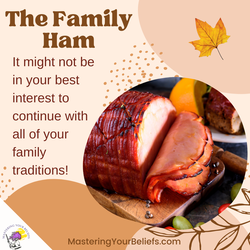|
The Story of “The Ham”
Years ago, I read a story about a young girl who was in the kitchen, watching her mother prepare the ham for their family dinner. When it was time to place the ham in the baking pan, her mother cut the exact amount off of each end of the ham, and then placed it in the pan. Wondering why the recipe called for the ends of the ham to be cut off before baking, the young girl asked her mother about it, “why do you cut the ends off of the ham before baking it?” The mother replied, “I’m not sure, but that’s the way my mother always did it so that’s the way I’ve always done it!” The daughter thought for a minute and said, “I’m going to call grandma and ask her.” The daughter called her grandmother and asked about the importance for cutting the ends off of the ham before baking. The grandmother replied, “I’ve always done it that way because my pan was too small for a whole ham.” Just like this family tradition of cutting the ends off the ham before putting it in the pan, family traditions are handed down generation after generation. These “family traditions” become beliefs (something we automatically do without questioning why). This may not seem like such a big deal when you’re talking about preparing a family meal but what about the beliefs we’ve created around relationships, health, money, college, career, etiquette, social hierarchy, divorce, marriage, religion, race or gender bias, politics, music, health care, the government, child rearing…? As children, we’re taught right from wrong based on what another person views as right or wrong, good or bad, acceptable or unacceptable. When every choice is made, based on a belief (something we automatically do without questioning why) is it any wonder why there are millions of adults asking themselves the same question: “why do I keep doing this to myself?” Our stories give us the power to achieve our success goals but they also have the power to convince us of why we don’t deserve to have something we say we want. Everything we have or don’t have is based on a belief (ours or the people who taught them to us). What is the holiday tradition you've created a story around that creates feeling of obligations, resentment, guilt, and the reason you're choosing to allow someone else to determine how you will spend your time? Holidays can be associated with beliefs about obligations and traditions that no longer serve you and only you can decide when it's time to go beyond your story about why the things that no longer serve you must continue to be followed. If you don't enjoy being around certain people, if the demands of others conflict with your own happiness or way of living or even if you want to create new traditions in your life, remember this... "No" is a complete sentence. Learn to put your wants and needs before the wants and needs of others. When you are happy and fulfilled, you will attract more of the same in every choice you make. Choose to live your best life! Sensei Nancy Mueller
0 Comments
Leave a Reply. |
AuthorNancy Mueller ~ Life Sensei Archives
April 2024
Categories |

 RSS Feed
RSS Feed
